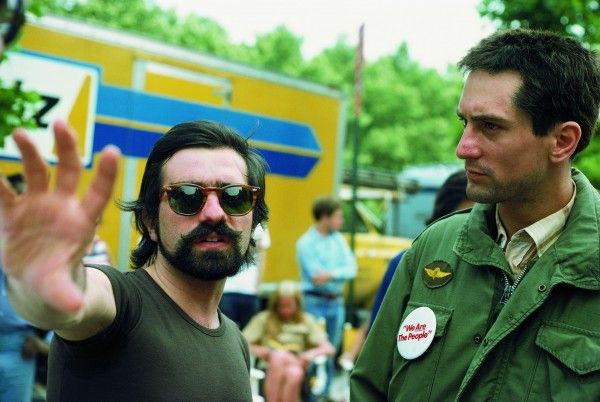It appears that legendary filmmaker Martin Scorsese is not a huge fan of the review aggregator site Rotten Tomatoes. The Oscar-winning director, who’s currently shooting the period gangster drama The Irishman for Netflix, has just published a guest column in the pages of The Hollywood Reporter in which he lays out, in great detail and with passion, why he feels box office obsession and Rotten Tomatoes are bad for the movie business. It’s not exactly a controversial standpoint—just earlier this year studios were trying to blame Rotten Tomatoes for bad box office—but it is interesting to hear from a filmmaker who’s made many movies over multiple decades, some great and some bad, to get some perspective on the current film criticism landscape.
Before we dive in, though, a quick note: film and TV reviews from Collider do get submitted to Rotten Tomatoes and show up on that website. Moreover, I think it’s important to make a distinction that, while I’m personally not a huge fan of Rotten Tomatoes’ binary system, I think a lot of the problems come from people judging a film by its score rather than using the Rotten Tomatoes page as a way to find individual reviews, which is certainly one of its intentions.
In a lengthy and well-written essay over at THR, Scorsese notes that box office obsession began in the 1980s, before which audiences didn’t care too much about how much money a movie made:
Box office is the undercurrent in almost all discussions of cinema, and frequently it’s more than just an undercurrent. The brutal judgmentalism that has made opening weekend grosses into a bloodthirsty spectator sport seems to have encouraged an even more brutal approach to film reviewing. I’m talking about market research firms like Cinemascore, which started in the late ‘70s, and online “aggregators” like Rotten Tomatoes, which have absolutely nothing to do with real film criticism. They rate a picture the way you’d rate a horse at the racetrack, a restaurant in a Zagat’s guide, or a household appliance in Consumer Reports. They have everything to do with the movie business and absolutely nothing to do with either the creation or the intelligent viewing of film. The filmmaker is reduced to a content manufacturer and the viewer to an unadventurous consumer.
Scorsese has a great point about “box office as spectator sport” here. I’m curious about box office numbers just like a lot of other cinephiles, but at the end of the day, myself and most of the people arguing about box office have absolutely no stake in whether a film succeeds or performs. Those numbers matter to the studio, which made the investment, and the filmmakers, who may have a percentage on the backend. But to pit films against each other at the box office like sports competitors and relish in their failure—which is a very, very real monetary hit to a studio and/or the filmmakers that sometimes even leads to a loss of work or job—is antithetical to the artistic spirit of filmmaking.
But box office is just the beginning, as Scorsese mostly takes issue with the tone that the blurb-worthy, binary system of Rotten Tomatoes sets:
These firms and aggregators have set a tone that is hostile to serious filmmakers—even the actual name Rotten Tomatoes is insulting. And as film criticism written by passionately engaged people with actual knowledge of film history has gradually faded from the scene, it seems like there are more and more voices out there engaged in pure judgmentalism, people who seem to take pleasure in seeing films and filmmakers rejected, dismissed and in some cases ripped to shreds. Not unlike the increasingly desperate and bloodthirsty crowd near the end of Darren Aronofsky’s mother!
Indeed, Scorsese says he was spurred to write the essay after seeing mother!:
After I had a chance to see mother!, I was even more disturbed by this rush to judgment, and that’s why I wanted to share my thoughts. People seemed to be out for blood, simply because the film couldn’t be easily defined or interpreted or reduced to a two-word description. Is it a horror movie, or a dark comedy, or a biblical allegory, or a cautionary fable about moral and environmental devastation? Maybe a little of all of the above, but certainly not just any one of those neat categories.
The filmmaker goes on to lavish praise on Aronofsky’s film while noting that it’s not a movie that’s easily decoded, and perhaps that’s one of the reason audiences and some critics reacted so passionately.
But I think Scorsese’s larger note about Rotten Tomatoes stands. The site serves as a swell guidebook that can point audiences in the right direction, but it also asks that audiences think for themselves. A film cannot be boiled down to a relatively meaningless Rotten Tomatoes score, which itself is aggregated from devolving lengthy pieces of film criticism into a “thumbs up” or “thumbs down" moniker with a one-sentence blurb. The best kind of film criticism is the kind that can challenge your way of thinking, that can open your eyes to seeing a film from someone else's point of view. And, yes, that can give the audience some idea of whether that movie is for them or not. But ultimately, that choice has to be made by the viewer.
Looking at a Rotten Tomatoes score of 47% and deciding that means you’re not going to see a movie is to relinquish your own decision-making skills. An example: If I was a person who only went by Rotten Tomatoes scores to decide if I was going to see a movie, the 28% stamped on King Arthur: Legend of the Sword would mean I’d be skipping that film. However, my decision to see that movie had nothing to do with its score. I considered the director (I’m not generally a Guy Ritchie fan but I really liked his last film, The Man from U.N.C.L.E., so perhaps I might like his next one?), the cast (Charlie Hunnam’s alright, but Jude Law sure is great), and of course the marketing (hey, that movie looks like a silly good time). So I saw King Arthur, and I really enjoyed it! Does that mean everyone else will like King Arthur? Absolutely not, but I made my decision to see the film based on my own moviegoing tastes and interests, not on a number grade.
Scorsese’s full essay is well worth reading over at THR, and he does have some interesting thoughts on mother! and film criticism as a whole that are worth considering. And while I do think critics can sometimes relish the opportunity to really tear a film up, I also think the “instant gratification” nature of the digital age as it relates to Rotten Tomatoes has led to more people simply glancing at a number rather than reading a critic’s full, reasoned, and thoughtful review.






